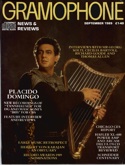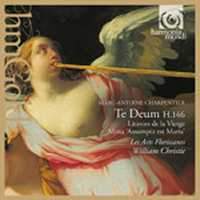Texte paru dans: / Appeared in:
|
|
|
Reviewer: Nicholas
Anderson
Recordings of Charpentier's Te Deum , with its celebrated opening Prelude are relatively plentiful, with versions by Michel Corboz, Louis Devos (both Erato/ RCA) and Malgoire (now advised for release on CBS) among those currently in the European catalogue . Much less favoured by recording companies, however, is the beautiful Mass, Assumpta est Maria which William Christie includes in this new release together with the most extended of Charpentier's nine settings of the Litanies de la Vierge. So many of Charpentier's strengths as a composer of sacred vocal music are evident in these works that we might almost regard it as a culmination of all that Christie has so far explored; but I very much hope that this is not a final gesture either on his part or that of Harmonia Mundi who , more than any other recording company, have rehabilitated the composer in the ears and eyes of the public.
Christie almost unfailingly has a lively sense of occasion and this is heightened at the outset of the Te Deum by his prefacing of it with one of Philidor the younger's stirring Marches de timbales. The air of expectancy is considerable, as is the ceremonial grandeur and the fervour with which Christie and his soloists imbue the music. The Prelude itself is crisply dotted and played with exuberance and vigour, and this spirit prevails throughout the canticle. Orchestral ensemble is not always impeccable but Christie's direction generates such excitement that I was quite effortlessly carried along by it.
The Mass Assumpta est Maria is of a strongly contrasting character with that of the Te Deum. It is a masterly work with passages of beauty perhaps unrivalled amongst Charpentier's compositions . H. W. Hitchcock places it around 1699 but Catherine Cessac in a recent study of the composer reckons it dates from 1702 when it was performed on August 15th; it was certainly Charpentier's last Mass, presumably composed for the Sainte Chapelle, and in this version , one of two , it is scored for strings in four parts, recorders , continuo, six-part chorus and a solo group of two sopranos, haute-contre, tenor , baritone and bass. Christie conveys the affective content of the music with his customary insight; the sublimely tender opening of the Credo, where the inner parts with their passing notes and suspensions move against the more static outer parts, is exquisitely handled. Yet in this section , and elsewhere too, the choir seldom place the consonants at the end of phrases either with much stylistic assurance or with even a modicum of finesse; and I was surprised to hear two badly audible edits , both of them in the Credo.
In spite of these rough edges I found much to enjoy in the performance. Neither of the two previous recordings listed above shows a comparable stylistic awareness and neither, in point of fact, is complete. Louis Martini on an old Vox LP (nla) omits the concluding "Domine salvum", but includes an Elevation, "In odorem unguentorum" (H51), a practice for which Charpentier made allowance; the English Bach Festival version on an Erato LP (nla) also omits the "Domine salvum", concluding with the Agnus Dei. Christie adds neither an Elevation nor follows Charpentier's intention of performing an additional motet after the " Domine salvum" ; but that is understandable since the composer never got round to composing it.
The remaining music on the disc belongs to the Litanies de la Vierge. I t was probably composed during the early to mid 1680s and intended for musicians in the service of the Duchesse de Guise, whom Charpentier himself was serving at the time. The work is scored for six soloists (three high voices, haute contre, tenor and bass) who unite for the six-part chorus, two treble viols and continuo. This is the most extended of Charpentier's settings of the Litany of Loreto and is striking both for its effectively contrasting sections and its skilful contrapuntal writing. The singers blend beautifully conveying both the music's radiance, as for instance in the "Rosa mystica", and its more reflective character.
All in all, a rewarding disc in spite of weak elements. Christie gave the same programme during the Journées Charpentier at Versailles, last October and recorded it in Paris shortly afterwards . Another performance of the Litanies, incidentally, was given at the Journées Charpentier by Jordi Savall and this, too, has been commercially recorded but so far has not reached this country. |
|
|
|
|
|
Cliquez l'un ou l'autre
bouton pour découvrir bien d'autres critiques de CD |
|




